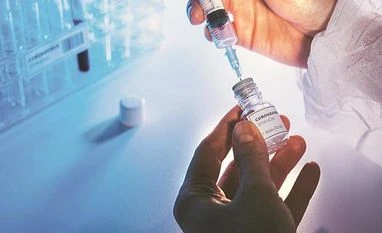With chances of affordable Covid-19 vaccine likely to be available by February 2021, 59 per cent Indians divulged that they will not rush to take it, a survey revealed on Wednesday.
The last few weeks have given hope to the world with three vaccine makers -- Pfizer, Moderna and Oxford-AstraZeneca releasing their efficacy data. Oxford-AstraZeneca has a partnership with Serum Institute of India for production and reports suggest that the vaccine could be available as early as February at Rs 500-600 per dose.
With the possibility of an affordable vaccine by February 2021, a survey was conducted by 'LocalCircles' to understand the hesitancy levels. The survey received more than 25,000 responses from citizens across 262 districts of India.
The first question in the survey asked, "The Covid-19 vaccine is likely to be available from February 2021 via private and Government channels. If that happens, what will be your approach to taking this vaccine?".
Responses from 8,936 citizens were received. Of which, 8 per cent said, "I am a health or frontline worker and will get it on priority through the government", 13 per cent said "will get it as quickly as it becomes available via any healthcare channel", 11 per cent said "will get it as quickly as it becomes available via private healthcare channel".
Another 59 per cent of respondents said that they will not rush to take the vaccine even if it is available in the near future. The perception of the majority of citizens sceptical on taking vaccine has not changed much as compared to the result of the survey conducted in mid-October by LocalCircles.
Sixty-one per cent of 8,312 voters at the time had said they are sceptical about COVID-19 vaccine and will not rush to take it in 2021 even if it is available.
More From This Section
Closer home in India, where Serum Institute of India is conducting trials for the vaccine under name Covishield, a participant who undertook the trial has alleged the vaccine of causing him serious side-effects, both neurological and psychological filing for damages against Serum.
Serum has dismissed the claims as "oblique pecuniary motive" maintaining that the participant's suffering was independent of the vaccine trial he underwent and has sought damages for malicious allegations in excess of Rs 100 crores.
According to some experts, Serum should have made the adverse event public with some already calling this low level of transparency on the vaccine and it possibly leading to increase in distrust amongst citizens.
In July 2020, citizens via LocalCircles had alerted the Drug Controller General of India (DCGI) on black marketing of Remdesivir leading to immediate issuance of an order by DCGI to all state drug controllers asking them to up enforcement against the same. Many posts have been received from citizens in the last 3 weeks raising concerns of black marketing of vaccine.
The second question asked citizens, "Once the COVID-19 vaccine is ready and commercially available, what is the level of black-marketing risk do you envisage?". 8,934 responses were received. Notably, 72 per cent Indians believe that once the vaccine is available, there is a high risk of it being sold in the market.
In mid-July, after the Remdesivir black marketing escalation, LocalCircles on citizen recommendation wrote to Department of Pharmaceuticals and Ministry of Health and Family Welfare to implement serial number and bar code based tracking of vaccine from factory to administration to a patient such that there is no room for black-marketing.
The same was acknowledged by Department of Pharmaceuticals which directed the National Pharmaceutical Pricing Authority (NPPA) to evaluate the same. In early October, the Government announced the implementation of a digital platform to track the administration of the COVID-19 vaccine, movement, storage and distribution to individual beneficiaries. However the timeline of this platform's availability is still unclear.
The third question asked citizens, "Should the vaccine be rolled out for hospitals only after a digital platform is introduced with the use of a unique serial number to track the supply of COVID-19 vaccine from factory to administration to citizens?".
Of 7,786 responses, 65 per cent of citizens believe that the COVID-19 vaccine should not be rolled out till a digital platform to track every dose from factory to final administration to citizens is functional.
With 65 per cent citizens believing that the vaccine should not be rolled for commercial or hospital use till the digital vaccine tracking platform is ready indicates that people of India believe that there is a high risk that the vaccine without a working digital platform could get in the wrong hands leading to black-marketing scenarios and even counterfeiting.
The digital vaccine tracking platform would reportedly need to track the supply of close to 1.7 billion Covid-19 vaccine doses needed to immunise most of India's adult population - a mammoth task than any in the history, keeping in mind the country's experience with large immunisation campaigns.
The Prime Minister has asked all States to set up steering committees and task forces, down to block level preparation for Covid-19 vaccine disbursal so India is prepared when the vaccine does become ready.
)